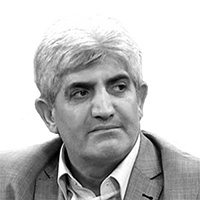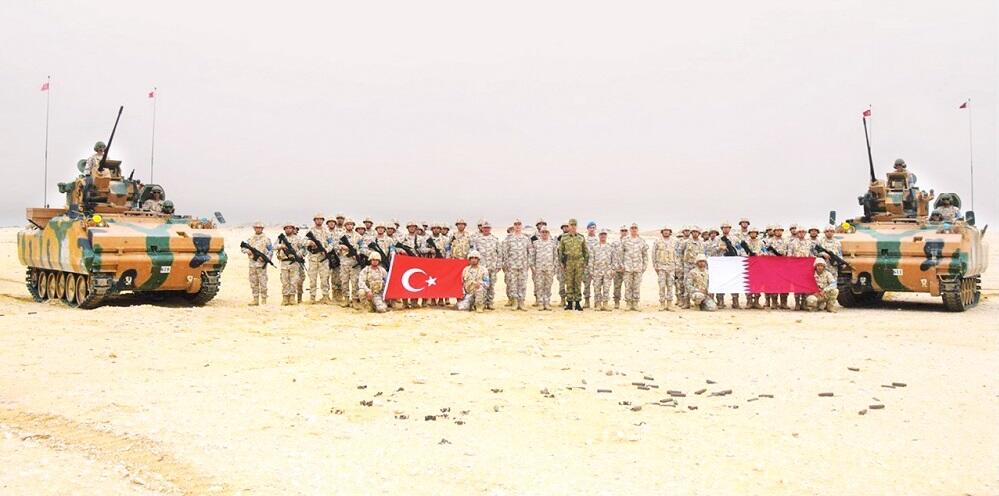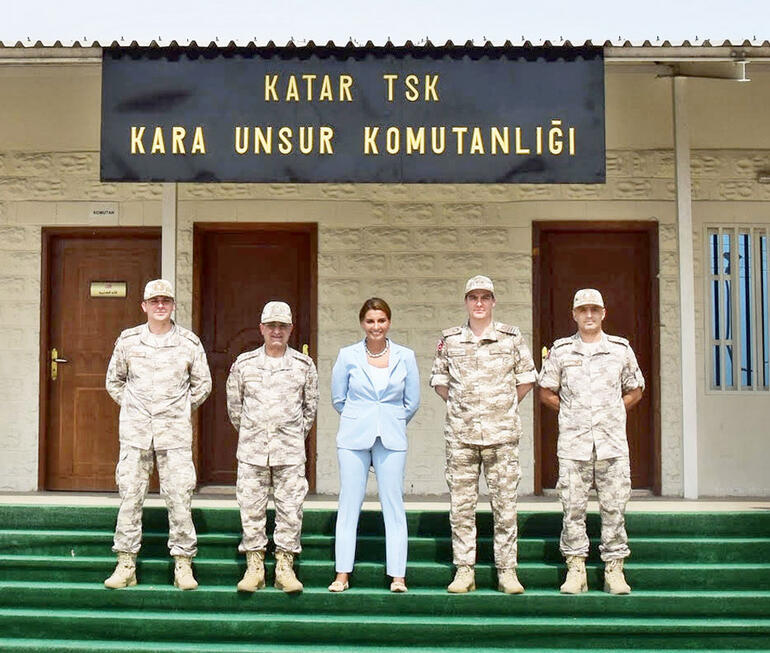www.aljazeerah.info
Opinion Editorials, December 2020
Archives
Mission & Name
Conflict Terminology
Editorials
Gaza Holocaust
Gulf War
Isdood
Islam
News
News Photos
Opinion Editorials
US Foreign Policy (Dr. El-Najjar's Articles)
www.aljazeerah.info
Can Turkey Replace the US-Iranian hegemony in the Middle East? By Ihsan Aktas Daily Sabah, December 26, 2020 |
 |
 |
 |
| Turkish-Qatari military troops in Qatar, file, August 14, 2019 hurriyet |
Turkish female journalist Hande Fırat of Hurriyet standing with Turkish military officers in their Doha base, August 2019 hurriyet |
Editor's Note:
Though the author has not mentioned it openly, he calls for a Pact between Turkey Iraq, and the Gulf Arab states, to replace the Iranian-US hegemony in the region. In his last line, he mentions the analogy with the Ottoman past. However, he HAS ignored the fact that Turkey is a member of the US-led NATO pact!
***
Middle East's Urgent Need for Peace Pact
When the Ottoman Empire disintegrated at the end of World War I, Great Britain and France rushed to fulfill their long-awaited aspirations in the Middle East.
After the end of the 400-year-long Ottoman rule, the Middle East was dragged into an era of political instability, wars, military occupations and civil wars which have continued to this day.
While Italy colonized several countries in North Africa, France and Great Britain seized areas in the Middle East, with the latter taking the lion's share.
A wave of independence movements began after the end of World War II, which concluded with the establishment of new states.
Unfortunately, most of the newly established governments soon became the puppet rulers of the neocolonial order, which focused on the exploitation of the natural resources of these countries.
Meanwhile, the hegemony of the United Kingdom was replaced with that of the United States.
Whenever a significant proportion of capital was accumulated in the Middle East, the neocolonial powers succeeded to retrieve this accumulated capital by inciting regional wars.
In the 1970s, Iraq, Iran and Saudi Arabia accumulated an extraordinary proportion of capital due to the oil crisis, while their economies achieved incredible growth rates.
However, a decade-long war between Iran and Iraq after the 1979 Iranian Revolution devastated the economies of these countries.
Spending almost $500 billion, the Iranian government transferred its national wealth to global arms cartels. Iraq was supported by Saudi Arabia and other Gulf countries, the rivals of Iran. To provide arms aid to Iraq, Saudi Arabia spent $600 billion, while other Gulf countries spent $400 billion.
By the time the Iranian-Iraqi war ended, both of these countries had already exhausted their material and human resources.
Despite their lavish support for Iraq, the Gulf countries still held a significant proportion of capital, while Iraq had turned into a giant market for arms worth $1 trillion.
In this historical conjecture, Iraq’s occupation of Kuwait was an unexpected turn of events. International relations experts discussed the political controversy about the incitement of this occupation by the U.S. embassy in Iraq.
In the Iranian-Iraqi war, the U.S. promised to protect the Gulf countries against the radical regime of Iran via Iraq.
In the First Gulf War, they promised to protect the Gulf countries against Iraqi expansionism. The U.S. administration announced the cost of this protection in a meeting in Saudi Arabia: $400 billion for Saudis and $300 billion for other Gulf countries.
During this period, Kuwait was one of the wealthiest countries in the world. However, after the end of the war, it wasn't left with much, as most of its wealth had been spent on gaining U.S. protection.
In the upcoming years, Iraq was occupied twice, first by the U.S. and then by Iran. Putting an end to the Iranian occupation of Iraq is proving to be more difficult than the withdrawal of the U.S. from the Iraqi lands.
Apart from the expansionist policies of the Iranian regime, religious and sectarian conflicts pose a great threat to peace and stability in the Middle East.
Recently, Iraqi Prime Minister Mustafa al-Kadhimi visited Ankara. The prime minister realized the importance of Turkey being the only emerging power that wishes to maintain Iraq's territorial integrity but also has sincere aspirations for the consolidation of political stability in the region as a whole.
Today, a peace pact in the Middle East appears to be an urgent necessity, which could only be established under the leadership of Turkey, a country with a centuries-old state tradition and cultural and religious ties with the region.
As 14th-century great Muslim thinker, Ibn Khaldun, argued: “The past resembles the future as one drop of water (resembles) another," Turkey’s future will resemble its Ottoman past.
Middle East's urgent need for peace pact | Daily Sabah
***
New Turkish military base in Qatar to inaugurate in autumn
Hande Fırat - DOHA
"Behind you is the sea, before you, the enemy. There is no turning back anymore.”
This is a quote by General Tariq ibn Ziyad, who ordered his ships to be burned to hinder fear in his soldiers, to avoid them fleeing, in 711 CE. His name was given to a military base in the Qatari capital of Doha. In that military base, there are Turkish soldiers as well. I, too, travelled to Doha and visited the Tariq ibn Ziyad base. Colonel Mustafa Aydın, the Turkish Armed Forces (TSK) commander of ground elements, told me about ibn Ziyad.
Turkish soldiers continue to perform their duties in Doha, under the Qatar-Turkey Combined Joint Force Command. Their numbers will increase in near future. Details will follow but first, I will tell you about the military base your soldiers have been fulfilling their duties, under 47 degrees Celsius.
Turkish soldiers were deployed to the said military base in October 2015, in a bid to contribute to the regional peace in scope of bilateral military relations of Turkey and Qatar. In December 2017, it was named the Qatar-Turkey Combined Joint Force Command.
Turkish and Qatari soldiers prepare joint training programs and conduct military drills. The warmness in the countries’ political relations remain the same in their military relations as well. In this Eid al-Adha holiday, soldiers from both countries met on the military post and exchanged greetings, as they do every holiday season. Turkish soldiers presented chocolates where Qatari soldiers offered breakfast. Qataris show their love for Turks at the military base as well. The soldiers greet each other in each other’s languages.
Turkey’s permanent military base in Qatar has a significance far beyond the bilateral relations of the countries.
Turkey has owned a military base at such location that is critical in Gulf and Middle East politics and strategic in energy matters. It also became a counterbalancing power concerning Iran and Saudi Arabia.
Qatar, which owns massive financial power, has the third largest natural gas reserves in the world. It is only neighbor in the land is Saudi Arabia.
It’s strategically significant
A crisis had risen in the Gulf when Saudi Arabia, UAE, Bahrain and Egypt cut their ties with Qatar and imposed economic blockade on June 5, 2017. When the Saudi-led states posted a 13-point demand list on June 23, 2017, they also wanted Qatar to terminate its military cooperation with Turkey and the closure of the Turkish military base.
When we consider the energy wars in the region, U.S.’s agenda oriented at Iran, Iran’s possible maneuvers using its Shi’s population and the Gulf countries’ -especially Saudi Arabia’s- covert or overt operations towards Turkey, we can comprehend the importance of the Turkish military base in Qatar, much better.
I do not know if a “superior mind” have advised the Saudi-led Gulf states to add the “Shut down the Turkish military base and halt military cooperation with Turkey inside of Qatar. But I would like to underline the fact that U.S. has about 14,000 soldiers at the Al Udeid Air Base.
All in all, the Gulf countries, especially Saudi Arabia, are uncomfortable with the Turkish-Qatari cooperation. In spite of all this, Turkey is trying to establish a durable security architecture and a military and political domain.
The number of Turkish soldiers in Qatar are rising
The military base in Qatar is getting bigger. A new base has been built near the Tariq ibn Ziyad military base. The grand base’s, in which a myriad of social facilities exist, construction is completed. The number of soldiers will increase. I am not giving numbers considering Turkey’s interests and security, but I can say that it will reach a drastic figure. Qatar also attaches a great deal of importance to this military base. They are talking about a “grand opening” ceremony in autumn. The inauguration ceremony is expected to be unveiled by the Qatari Emir and President Recep Tayyip Erdoğan.
New military base in Qatar to inaugurate in autumn - Turkey News (hurriyetdailynews.com)
***
Share the link of this article with your facebook friends
|
|
|
|
||
|
||||||


